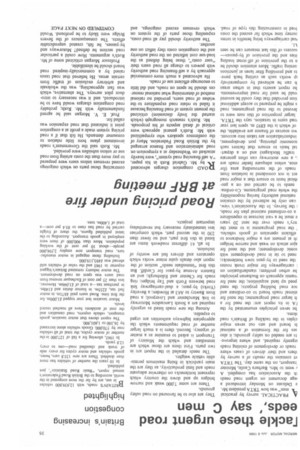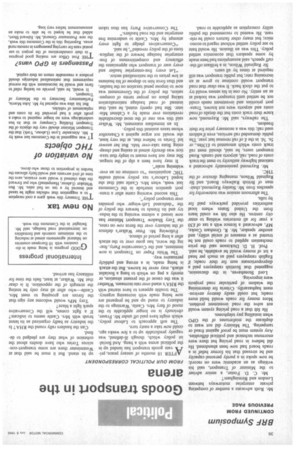Road pricing under fire at BRF meeting
Page 37

Page 38

If you've noticed an error in this article please click here to report it so we can fix it.
ROAD congestion charges advocated by Mr. Gabriel Roth in his paper, "A self-financing road system", were heavily attacked on Wednesday at a symposium on road administration and finance arranged by the British Road Federation. Many of the conference speakers who sympathized with Mr. Roth's general approach were critical of detail aspects of his proposals.
Mr. Roth's research monograph (which started the lively discussion) criticized the present system of road financing because it failed to relate road expenditure to the wishes of road users, provided no rational method of determining what national resources should be spent on roads, and did little to encourage efficient use of roads.
He advocated a much more commercial approach by a self-financing road authority with powers to charge all road users their "user costs", these being defined as the load-use cost inflicted on the road authority and the congestion costs they inflict on one another.
The authority should pay all road costs, expanding those parts of the system on which revenues exceed outgoings, and contracting those parts on which outgoings exceed revenues unless users were prepared to pay more than the costs arising from road use or unless subsidies were provided.
Mr. Roth said the Government's roads investment plans bore little relation to consumer demands. He felt that if a road pricing system Made a profit at a congestion point it indicated that road expansion was called for.
Prof. E. V. Morgan said he agreed fundamentally with Mr. Roth; probably road congestion charges would have to be introduced, and it was necessary to introduce pilot surveys. The alternative, which was fast approaching, was the wholesale and arbitrary exclusion of traffic from certain areas. He believed that road taxes raised by a commercially-inspired road board should be identifiable.
Professor Morgan criticized some of Mr. Roth's arguments. How could a particular road section be defined? Motorways and by-passes, he felt, created unpredictable effects. The consequences of the Severn Bridge were likely to be profound. Would CONTINUED ON NEXT PAGE Mr. Roth advocate a number of competing private enterprise motorways between London and Birmingham?
Mr. C. D. Foster, a senior adviser to the Minister of Transport, said his writings as an academic were on record; he now spoke in a purely personal capacity and he stressed that his former belief in a roads board had now been abandoned. He did believe in road pricing but there were enormous technical and political difficulties. -Any system must be proof against fraud or tampering. The Ministry did not want to duplicate the misfortunes of the GPO when installing pay telephones.
He felt that a road pricing system would not solve the road investment problem. More money for roads would build more roads; but could easily destroy environment haphazardly. Criteria for determining the wisdom of particular road projects were improving.
Lord Stonehaven, in the discussion, suggested that Scottish ratepayers paid a disproportionate sum for their roads; if English ratepayers paid as much per head a lot of money would be available, he said.
Prof. H. D. Dickinson said the price mechanism applied to roads could not be trusted as a measure of social utility, and another speaker, Mr. R. Gresham Cooke, MP, advocated a licence with a tax of £30 a year for all motorists wishing to enter city centres. He also felt we could learn from the United States where local authorities provided parkways paid for by tolls.
The afternoon session was noteworthy for speeches from Mr. Stanley Raymond, chairman of British Railways Board, and Sir Reginald Wilson, managing director of the THC.
Mr. Raymond passionately advocated a national highway authority to meet the track costs of road, rail, airports and canals. Road transport users, he said, should meet rail track costs which amounted to 30m., or 5s. 7d. in the £ of rail revenue last year. The public demanded rail services, even if seldom used rail; this was a necessary price for their freedom.
The railways, said Mr. Raymond, now knew their track costs but the details of road costs and airports were not known. Transport priorities and investment needs could not be settled until transport was looked at as an entity. No one in his senses would try to put the clock back. It was clear that road transport would continue to grow at an increasing rate; but public transport was still required at times by all users.
Sir Reginald Wilson, in a brilliant off-thecuff speech, said assumptions had been made by some speakers that economics settled policy. This was an illusion. He would hate to see policy settled without regard to economics; but many other factors could be relevant. He wanted to recommend the public utility conception as applicable to road.




























































































































